- Главная
- Разное
- Бизнес и предпринимательство
- Образование
- Развлечения
- Государство
- Спорт
- Графика
- Культурология
- Еда и кулинария
- Лингвистика
- Религиоведение
- Черчение
- Физкультура
- ИЗО
- Психология
- Социология
- Английский язык
- Астрономия
- Алгебра
- Биология
- География
- Геометрия
- Детские презентации
- Информатика
- История
- Литература
- Маркетинг
- Математика
- Медицина
- Менеджмент
- Музыка
- МХК
- Немецкий язык
- ОБЖ
- Обществознание
- Окружающий мир
- Педагогика
- Русский язык
- Технология
- Физика
- Философия
- Химия
- Шаблоны, картинки для презентаций
- Экология
- Экономика
- Юриспруденция
Что такое findslide.org?
FindSlide.org - это сайт презентаций, докладов, шаблонов в формате PowerPoint.
Обратная связь
Email: Нажмите что бы посмотреть
Презентация на тему Italian cuisine and its features
Содержание
- 2. Soup is not the invention of the
- 3. More from ancient times in Italian cuisine
- 5. Since ancient Romans on Italian tables adorned
- 7. Speaking of Italian cuisine not to mention
- 9. Popular in Italian ravioli - probably also
- 10. Risotto - one of the most popular
- 12. A special role is given in Italian
- 14. Italian cheeses - an indispensable element of
- 16. Italians are very fond of ice cream,
- 18. Winery in Italy sessions so old that
- 19. Скачать презентацию
- 20. Похожие презентации
Soup is not the invention of the Italians, but they have taken the word. Soup in Italian means something softened, that drink.

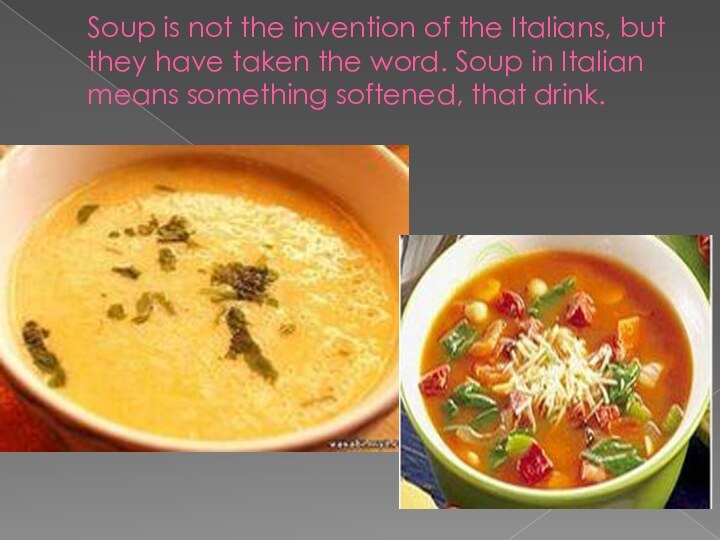
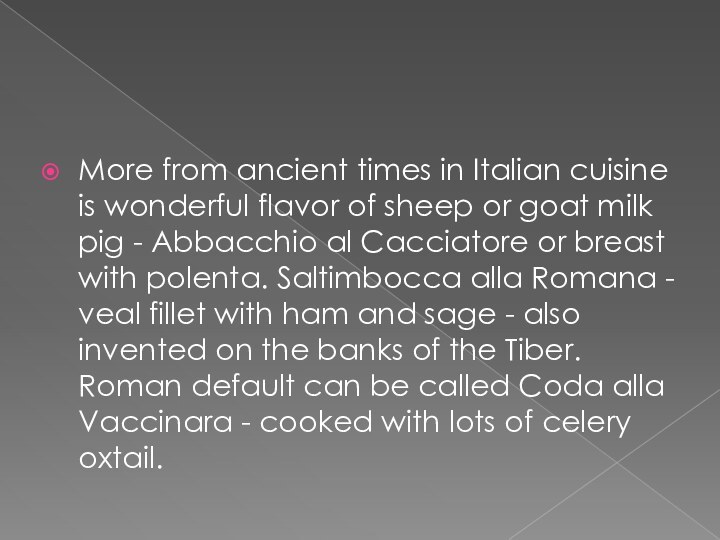

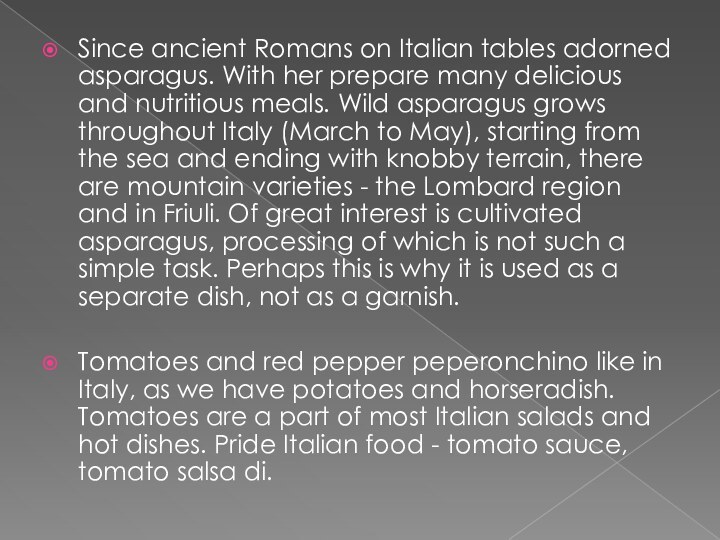



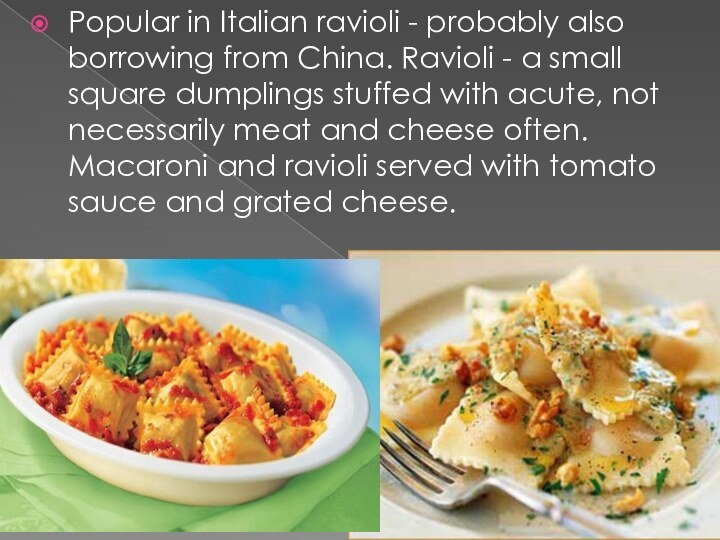
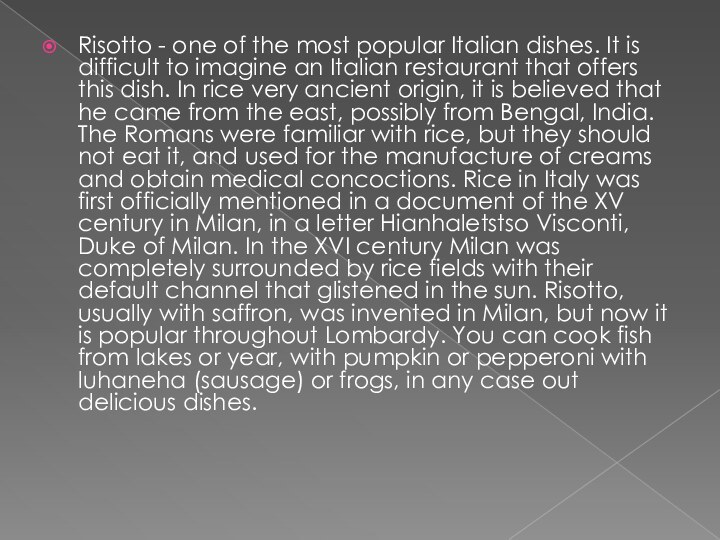

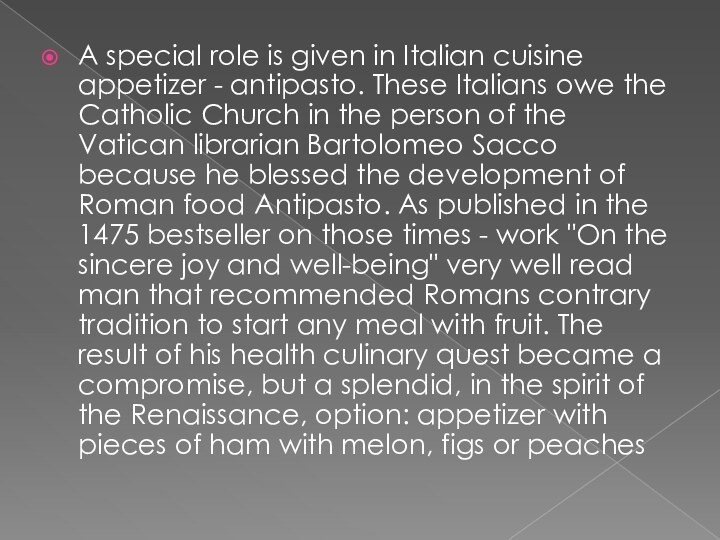
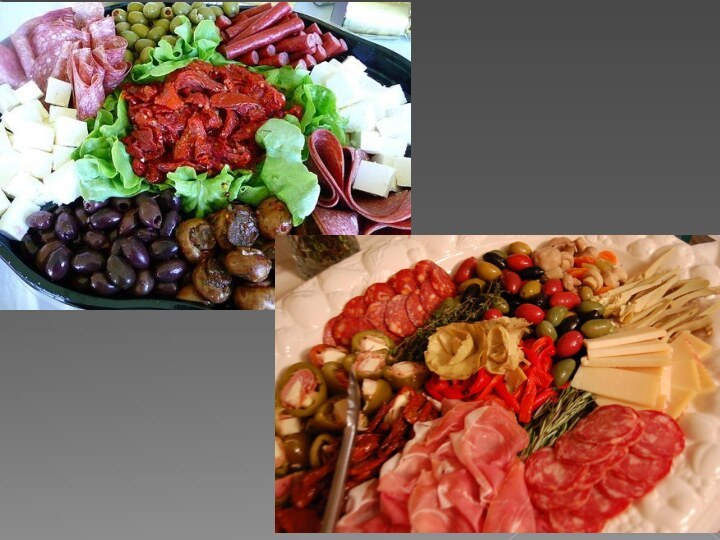




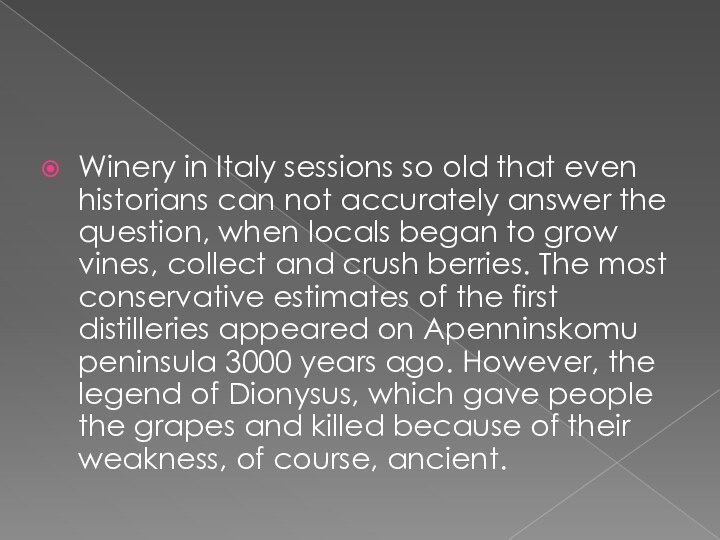

Слайд 3 More from ancient times in Italian cuisine is
wonderful flavor of sheep or goat milk pig -
Abbacchio al Cacciatore or breast with polenta. Saltimbocca alla Romana - veal fillet with ham and sage - also invented on the banks of the Tiber. Roman default can be called Coda alla Vaccinara - cooked with lots of celery oxtail.Слайд 5 Since ancient Romans on Italian tables adorned asparagus.
With her prepare many delicious and nutritious meals. Wild
asparagus grows throughout Italy (March to May), starting from the sea and ending with knobby terrain, there are mountain varieties - the Lombard region and in Friuli. Of great interest is cultivated asparagus, processing of which is not such a simple task. Perhaps this is why it is used as a separate dish, not as a garnish.Tomatoes and red pepper peperonchino like in Italy, as we have potatoes and horseradish. Tomatoes are a part of most Italian salads and hot dishes. Pride Italian food - tomato sauce, tomato salsa di.
Слайд 7 Speaking of Italian cuisine not to mention the
wonderful pasta. Historians claim that pasta brought with him
from China Marco Polo as a souvenir. It was a thin tube of dough, however, the Chinese made them with rice flour. The literature pasta first mentioned in "Decameron" Boccaccio. Some argue that the name given to a cardinal pasta that saw them for the first time at his desk, exclaimed: "Oh, ma Caron!" - Which means "Oh, how cute!". Others argue - they say that the ancient Greeks, encountering something special that they liked in the southern cities of Italy, called word maccherone.Слайд 9 Popular in Italian ravioli - probably also borrowing
from China. Ravioli - a small square dumplings stuffed
with acute, not necessarily meat and cheese often. Macaroni and ravioli served with tomato sauce and grated cheese.Слайд 10 Risotto - one of the most popular Italian
dishes. It is difficult to imagine an Italian restaurant
that offers this dish. In rice very ancient origin, it is believed that he came from the east, possibly from Bengal, India. The Romans were familiar with rice, but they should not eat it, and used for the manufacture of creams and obtain medical concoctions. Rice in Italy was first officially mentioned in a document of the XV century in Milan, in a letter Hianhaletstso Visconti, Duke of Milan. In the XVI century Milan was completely surrounded by rice fields with their default channel that glistened in the sun. Risotto, usually with saffron, was invented in Milan, but now it is popular throughout Lombardy. You can cook fish from lakes or year, with pumpkin or pepperoni with luhaneha (sausage) or frogs, in any case out delicious dishes.Слайд 12 A special role is given in Italian cuisine
appetizer - antipasto. These Italians owe the Catholic Church
in the person of the Vatican librarian Bartolomeo Sacco because he blessed the development of Roman food Antipasto. As published in the 1475 bestseller on those times - work "On the sincere joy and well-being" very well read man that recommended Romans contrary tradition to start any meal with fruit. The result of his health culinary quest became a compromise, but a splendid, in the spirit of the Renaissance, option: appetizer with pieces of ham with melon, figs or peachesСлайд 14 Italian cheeses - an indispensable element of Italian
meal. In Italy produces about 400 varieties of cheese,
the most popular - mozzarella (mozzarella), horhontsola (gorgonzola) and cheese (parmigiano - «Parmigiano"). But in addition to these, there are many others.Слайд 16 Italians are very fond of ice cream, which
there are many types.
Other desserts:
Panettone - High School of
yeast dough baked in a cylindrical shape.Tiramisu - cream dessert with "mascarpone" and cocoa.
Cassata





























